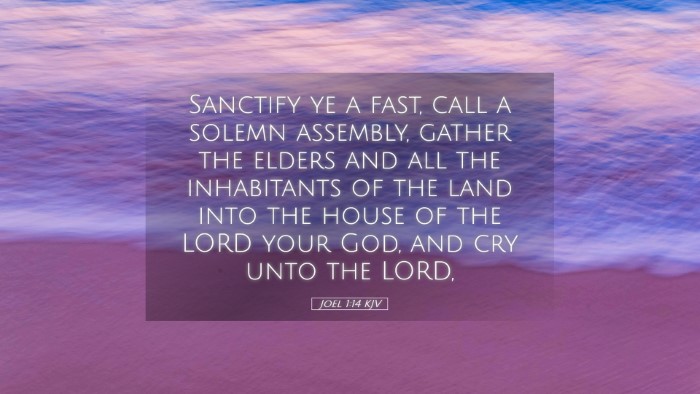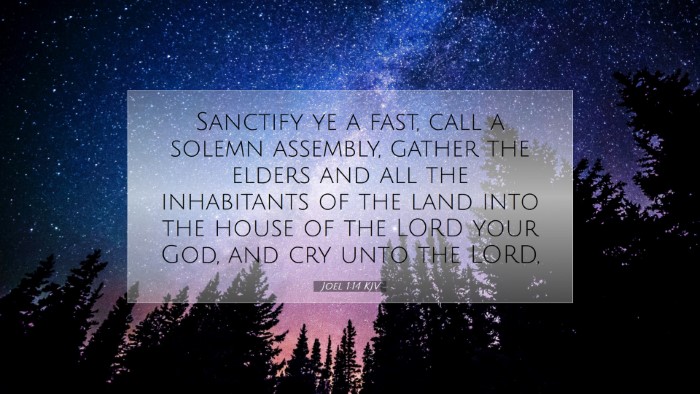Old Testament
Genesis Exodus Leviticus Numbers Deuteronomy Joshua Judges Ruth 1 Samuel 2 Samuel 1 Kings 2 Kings 1 Chronicles 2 Chronicles Ezra Nehemiah Esther Job Psalms Proverbs Ecclesiastes Song of Solomon Isaiah Jeremiah Lamentations Ezekiel Daniel Hosea Joel Amos Obadiah Jonah Micah Nahum Habakkuk Zephaniah Haggai Zechariah MalachiJoel 1:14
Joel 1:14 KJV
Sanctify ye a fast, call a solemn assembly, gather the elders and all the inhabitants of the land into the house of the LORD your God, and cry unto the LORD,
Joel 1:14 Bible Commentary
Bible Commentary on Joel 1:14
Verse: "Sanctify ye a fast, call a solemn assembly, gather the elders and all the inhabitants of the land into the house of the LORD your God, and cry unto the LORD."
Introduction
The book of Joel addresses a critical time of calamity for the people of Israel and calls for national repentance. In Joel 1:14, the Lord seeks a response from His people to the devastating locust plagues as an appeal to return to Him. This verse serves as a call to action, urging the community to acknowledge their dire state and seek the face of God through fasting and assembly.
Understanding the Context
Before delving into the specifics of this verse, it is essential to comprehend the context in which Joel writes. The opening chapter vividly describes a locust invasion seen as a divine judgment upon the land. The natural disasters depicted serve as a metaphor for spiritual desolation, pointing to the need for revival.
Analysis of Key Terms
- Sanctify ye a fast: The term "sanctify" implies making something sacred or setting it apart for a holy purpose. Here, God calls His people to intentionally set aside time for fasting, which is an act of humility and acknowledgment of their need for divine intervention.
- Solemn assembly: This denotes a formal gathering, indicative of the seriousness of the situation. It is a communal act of repentance where the entire nation is united in seeking God.
- Gather the elders: The elders represent the leadership and wisdom of the community. Their involvement underscores the importance of guidance and authority in leading the people back to God.
- Cry unto the LORD: This phrase emphasizes the urgency and passion needed in seeking God's mercy. It suggests an earnest prayer and heartfelt plea for restoration.
Commentaries from Notable Scholars
Matthew Henry
Matthew Henry highlights that the call to sanctify a fast is a response to calamity, indicating that such a national emergency requires collective repentance. He notes that fasting is an expression of humility before God and that sincere recognition of sin is paramount at this moment. Henry further emphasizes the gravity of the situation by reminding readers that genuine fasting and prayer can lead to divine intervention and mercy.
Albert Barnes
According to Albert Barnes, the call for a solemn assembly reflects the seriousness of the locust plague and the impending judgment. He interprets this command as not merely a ritual practice but as a vital necessity for communal recognition of sin and seeking God's favor. Barnes encourages readers to understand that such gatherings should focus not just on the outward expression of fasting but on sincere repentance and the contrition of heart.
Adam Clarke
Adam Clarke elaborates on the significance of the assembly, emphasizing that it symbolizes unity and a collective return to God. He notes that the elders play a critical role in this process as they guide the people spiritually. Clarke articulates that the act of crying out to the Lord signifies desperation and recognition of their unfavorable position, urging a deep commitment to seek God's mercy.
Theological Implications
- Corporate Repentance: Joel 1:14 emphasizes the importance of collective repentance within the community of believers. It underscores the idea that sin can affect an entire nation, and corporate acknowledgment of wrongdoing is crucial for reconciliation with God.
- The Role of Leadership: The mention of elders highlights the significance of spiritual leadership in guiding congregations back to God. Leaders are called to model repentance and lead their people in seeking divine restoration.
- Fasting as a Tool for Humility: The act of fasting signifies a recognition of human frailty and the need for divine assistance. This practice serves as a reminder of reliance on God for sustenance and spiritual vitality.
Applications for Pastors and Theologians
For pastors and theological students, Joel 1:14 offers profound insight into the nature of communal worship and the importance of recognizing national and personal sin. This scripture invites leaders to initiate times of prayer and fasting, encouraging their congregations to come together in solemnity before the Lord.
Moreover, this verse can serve as a model for addressing contemporary issues within the church and society where collective repentance and seeking divine guidance are necessary. It reminds leaders to challenge their congregations to get involved in a sincere pursuit of holiness and to seek God earnestly for restoration.
Conclusion
Joel 1:14 stands as a powerful exhortation for God's people to respond to calamity with sincere repentance. By heeding the call to fast, gather, and cry unto the Lord, believers open the door to divine mercy and restoration. The insights from public domain commentaries underscore the importance of corporate humility, the role of leaders, and a deep-seated desire for connection with God in times of crisis. As we reflect on this verse, may we also be stirred to seek God with urgency in our own contexts, knowing that He is always ready to hear our cries.


